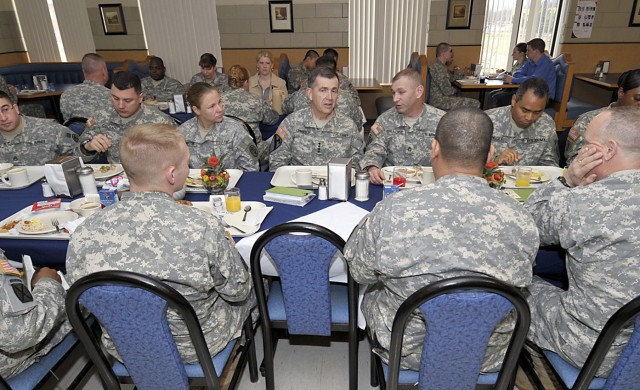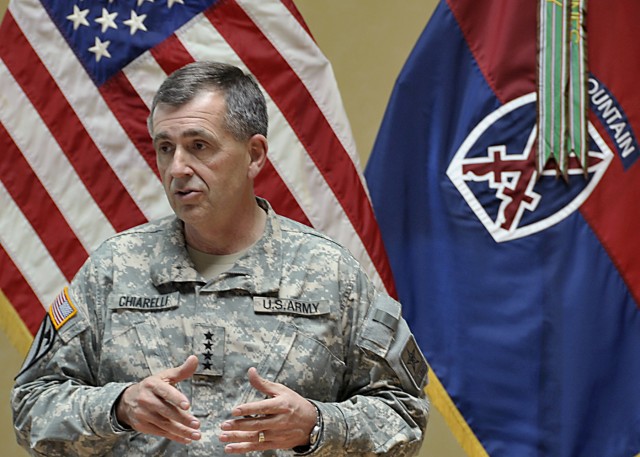FORT DRUM, N.Y. (Army News Service, April 2, 2009) -- During the past two weeks, Gen. Peter W. Chiarelli, vice chief of staff of the Army, has traveled to six installations to hear from Soldiers, family members and support agencies on what is being done and what the Army should do to help end suicide.
Chiarelli was named in January to head a task force to address the rising number of suicides among Soldiers. He is scheduled present his findings from his eight-day trip to the Department of Defense in June.
"It has been a most enlightening trip, and we've learned a lot," Chiarelli said. "And we think we've learned a lot that is going to help the Army as it tackles and works to lower the number of suicides that we are experiencing in the Army today.
"This is a very complicated issue, and this eight-day trip has proven to me that its even more complicated than I thought it was before," he added.
He started his tour at Fort Jackson, S.C., before visiting Fort Bragg, N.C.; Fort Campbell, Ky.; Fort Lewis, Wash.; Fort Hood, Texas; and ended his trip Tuesday at Fort Drum.
"We know the stress our Soldiers and families are experiencing across the force (is) resulting in disturbing trends," Chiarelli said at Fort Drum. "Just one manifestation that I have become intimately familiar with over the past few months is our rate of suicides. The statistics are pretty clear, ...and we know that much is attributable to the immense strain we have placed on the all-volunteer force that fights valiantly every day on behalf of the nation.
"Lives and family plans have been put on hold in defense of our ideals," he added. "We are 'out of balance,' and we know it. But that is not an acceptable excuse for inaction."
Chiarelli said one of the biggest items to overcome in dealing with suicide prevention is the stigma that goes with Soldiers seeking mental health treatment.
"It is something we have to address as leaders head on," he said. "Our culture today seems to look at Soldiers seeking mental health (treatment) as a sign of weakness. What I'd like feedback on from the field is how we move our culture away from this stigma to a recognition that mental health has to be fostered the same way we foster physical fitness."
The number of suicides in the Army has steadily increased since 2006. In that year, 102 suicides were confirmed. In 2007, there were 115, and in 2008, the Army reported 143 confirmed suicides.
At Fort Drum, there were two confirmed suicides by 10th Mountain Division (Light) Soldiers in 2006. Two deaths at Fort Drum were ruled suicides in 2007 and one in 2008.
"It seems to me that leaders at Fort Drum are doing everything they possibly can to ensure they erase the stigma associated with Soldiers who reach out and ask for help," Chiarelli said. "And something that is so absolutely critical is that we get rid of that stigma. And that stigma is not the Army's alone; it exists in civilian life also.
"But we've recognized it; we realize that is something that we've got to tackle," he added. "Fort Drum convinced us that the leadership here, at all levels, from the top of Fort Drum down to the intermediate noncommissioned officers, are tackling that issue, and that is absolutely critical."
Before leaving Fort Drum, Chiarelli talked about how personal the issue is to him and his hopes to vanquish the enemy that is suicide.
"It rips your heart out," he said. "It tears you up to see these suicides. It tears you up to see some of the pain that our Soldiers and Families are going through."
(Jason Cutshaw writes for the Fort Drum installation newspaper.)




Social Sharing